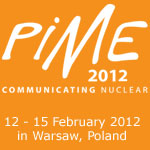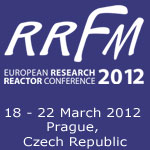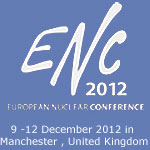
|
|
Finalised UK Nuclear Proposals Back Eight Sites For Potential New-BuildPolicies & Politics 23 Jun (NucNet): The UK government today published finalised proposals that name eight sites across the country as suitable for the construction of new nuclear plants by 2025.Presenting the proposals to parliament, minister of state for energy Charles Hendry said: "Industry needs as much certainty as possible to make such big investments. These plans set out our energy needs to help guide the planning process, so that if acceptable proposals come forward in appropriate places, they will not face unnecessary hold-ups."
|
Economist Report Sees 27% Growth In Nuclear Generation By 2020
Plans & Construction
16 Jun (NucNet): Nuclear capacity in the world’s top 10 nuclear generating countries is set to grow by 27 percent or more than 80 gigawatts (GW) by 2020, a report from The Economist Intelligence Unit (EIU) says.
The report says the top 10 countries have around 320 GW of nuclear infrastructure between them and by 2020 this will increase to 405 GW.
The report concludes: “But this is only part of the picture, as countries from eastern Europe to Africa are also showing an interest in going nuclear.
“Taken together, it looks like something of a renaissance.”
The report says the impression that emerges from much commentary in the months since the crisis at Fukushima-Daiichi is that the nuclear industry now risks being banished to the Dark Ages.
For certain countries, the effect of Fukushima-Daiichi on popular and political support for nuclear power is significant, the report says.
“Burgeoning support for the abandonment of nuclear recently swung elections in Germany, which now plans to phase out nuclear power altogether. Japan, still reeling from its traumas, said it will not build any new reactors, whereas before the natural disaster it envisioned a new fleet.”
But the report says much of the nuclear scepticism that other governments have signalled does not represent an erosion of enthusiasm for nuclear power. Rather, it has more to do with showing tact in front of a jittery public.
This is, crucially, the case in the world’s keenest builder of nuclear plants: China, where the EIU predicts nuclear capacity will increase from 10.1 GW in 2010 to 63.1 in 2020, a rise of 527 percent.
In the US, the world’s leading generator of nuclear energy, capacity is seen growing from 101.1 GW in 2010 to 109 in 2020. In France, Europe’s leading nuclear generator, it could grow from 63.3 GW in 2010 to 66.4 in 2020.
Russia, says the EIU, will see an increase in nuclear capacity of 81 percent from 2010 to 2020, from 22.7 GW to 41 GW.
Martin Adams, the EIU’s energy editor, said he was initially surprised by the results, but now thinks they make sense. “A lot of the headlines have been very gloomy, but in fact the factors which have driven countries to build nuclear, those factors are still in place.”
Ministerial Meeting Calls For Worldwide Stress Tests
Security & Safety
7 Jun (NucNet): All countries with nuclear facilities should carry out safety audits or “stress tests” based on initial feedback from the accident at the Fukushima-Daiichi nuclear power plant in Japan, 33 countries taking part in a ministerial seminar agreed today.
The countries said the tests, already being carried out in Europe, would enable an evaluation of the safety of nuclear facilities and test their capacity to withstand major incidents.
Countries taking part in the ministerial seminar, held today in Paris, also said it was necessary to reinforce “the global role and missions” of the International Atomic Energy Agency (IAEA), and in particular the nuclear safety review mechanisms for which it is responsible.
They called for reinforcement of the safety activities of the OECD Nuclear Energy Agency with a view to greater harmonisation of safety practices.
They also proposed that the IAEA review its safety standards in light of the Fukushima-Daiichi accident and ensure their proper application. In particular, the IAEA should review its standards on the construction and operation of nuclear power plants in seismic zones while taking account the impact of climate-related events.
Nathalie Kosciusko-Morizet, France’s minister for ecology, sustainable development, transport and housing, organised today’s seminar at the request of president Nicolas Sarkozy.
She said: “We cannot continue to think the way we did before Fukushima. What we have learned from this disaster, and what we must remember, is that one accident at a nuclear power plant is enough to create grave and irreversible consequences for man and the environment.”
Ms Kosciusko-Morizet said it is essential to improve co-operation on nuclear safety internationally because it is “not yet at its best possible level”.
Other proposals discussed at the seminar included the development of “emergency intervention teams” for crisis management at nuclear facilities.
Ministers called for crisis management training to be carried out at international level in order to benefit from the maximum amount of experience.
Ms Kosciusko-Morizet called for the harmonisation of crisis management procedures such as establishing distances for evacuation zones and the ceilings above which iodine tablets should be taken.
Ms Kosciusko-Morizet will present the conclusions of the seminar to nuclear regulatory authorities tomorrow.
The conclusions – along with those from her meeting with regulators tomorrow – will also be presented to the IAEA as part of its preparations for a ministerial conference on nuclear safety to be held in Vienna later this month.




